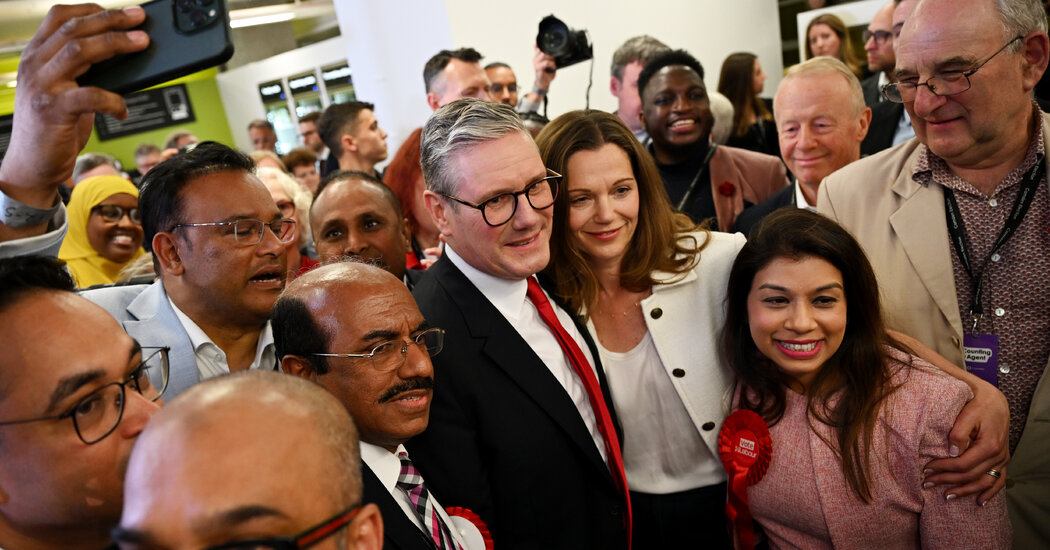From the day that Keir Starmer became the head of the Labour Party in 2020, he made repairing ties with British Jews a priority, calling antisemitism a “stain” on the party.
On Thursday, many British Jews who had turned away from Labour in the 2019 general election gave the party another chance. Labour won back several North London constituencies with significant Jewish populations.
Nearly half of Jewish voters planned to support the Labour Party in Thursday’s election, according to a poll of 2,717 Jewish adults who responded to the Jewish Current Affairs Survey taken in June, before the election.
Britain’s 287,000 Jews make up less than 0.5 percent of the country’s population, and some of them had been politically homeless under the leadership of Jeremy Corbyn, the Labour Party’s former leader, who was accused of having let antisemitism flourish within the party. Jewish support for the party under Mr. Corbyn reached a low of 11 percent in the 2019 general election, according to the Institute for Jewish Policy Research, which focuses on Jewish life in Europe.
“It’s very clear that Jews have flocked back to what I think to many people has long been their natural political home,” said Jonathan Boyd, the executive director of the Institute for Jewish Policy Research, which is based in London.
Sarah Sackman, the Labour candidate for the North London constituency of Finchley and Golders Green, where nearly one in five voters are Jewish, the largest proportion in Britain, was elected on Thursday. Labour candidates in the North London constituencies of Hendon, where 14 percent of voters are Jewish, and Chipping Barnet, where nearly 7 percent of voters are Jewish, also won.
Josh Simons, a Jewish Labour politician who on Thursday was elected to Parliament to represent the constituency of Makerfield, west of Manchester, said Labour’s victories in North London showed that Jewish voters were open to trusting the party again.
“The turnaround in the relationship between the Labour Party and the Jewish community in Britain is fairly extraordinary,” Mr. Simons said, citing Mr. Starmer’s willingness to force out Labour politicians who made antisemitic comments. “The Jewish community saw the choices he made, and that, bit by bit, started to rebuild trust.”
Mr. Starmer, who describes himself as an atheist, is married to Victoria Starmer, who comes from a Jewish family. Mr. Starmer has said that his family occasionally goes to a liberal Jewish synagogue, and he said in an interview with Virgin Radio U.K. that he stops working on Friday nights at 6 p.m. After Conservative politicians criticized him for this, saying he wanted to be a part-time prime minister, Mr. Starmer stood by his comments.
“I would have thought to anybody it’s blindingly obvious that a Friday night is quite important in some religions and faiths,” he said at a campaign event in Derbyshire, England.
In 2020, Mr. Starmer ousted Mr. Corbyn from the party following the release of a report by a British human rights watchdog that found Labour bore responsibility for “unlawful acts of harassment and discrimination” against Jewish members on Mr. Corbyn’s watch. Complaints about Mr. Corbyn included his defending a mural that featured grotesque caricatures of hooknosed Jewish bankers.
After initially suggesting that the party’s problems with antisemitism were overblown, Mr. Corbyn later issued a statement saying that “the vast majority of Labour Party members were and remain committed anti-racists deeply opposed to antisemitism.”
Labour’s surge in support among Jewish voters came as the party appeared to lose support among British Muslims, some of whom criticized Mr. Starmer for taking too long to pledge his commitment to recognizing an independent Palestinian state. At least four constituencies that had been Labour strongholds were on Thursday won by candidates who offered an alternative to Labour’s Gaza policy.
Shockat Adam Patel, an independent candidate in a constituency in Leicester, England, beat Labour’s Jonathan Ashworth, who had been expected to hold a cabinet role in Mr. Starmer’s new government. “This is for Gaza,” he said. Mr. Corbyn, who ran as an independent candidate in Islington, won a seat in Parliament from the Labour Party on a platform that focused on Gaza.
